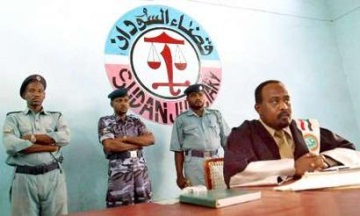Sudan to establish special court for Darfur crimes and appoints new special prosecutor
January 10, 2012 (KHARTOUM) – The Sudanese justice minister Mohamed Bushara Dousa issued a decree on Tuesday by which he appointed a special prosecutor for Darfur and announced that he will soon establish a special court to handle the “gravest” crimes committed in Sudan’s western region.

Abdel-Motalib will carry out his task in accordance with international humanitarian law and Sudan’s ant-terrorism law of 2001, according to Sudan state media.
El-Fasher, the capital of north Darfur, will house the offices of the special prosecutor with a possibility of establishing regional offices in other parts of Darfur.
The decision also authorized the special prosecutor to create a coordination mechanism between his office and other agencies that deal with related issues.
Today’s decree is part of the requirements stipulated by the Doha Document for Peace in Darfur (DDPD) signed between Khartoum and the Liberation and Justice Movement (LJM) last July.
Amin Hassan Omer, who oversees implementation of DDPD from the government side, said that a fund will be established by Khartoum for support of justice in Darfur.
He called on the international community to support the fund in order to protect witnesses for the sake of achieving justice in Darfur.
Omer also disclosed that a human rights commission will come into being in the coming days per the orders of president Omer Hassan al-Bashir and will also create offices in Darfur after consultation with Darfur Transitional Authority (DTA).
He expressed hope for concerted efforts among institutions towards enforcing justice at all levels and cementing a new relationship of reconciliation between individuals, society and tribes.
This is not the first time since the conflict started in Darfur eight years ago that the Sudanese government created special courts and appointed a special prosecutor.
Sudan created the position of a special prosecutor for Darfur in 2003 in order to prove its seriousness in going after the perpetrators of crimes allegedly committed in the course of Khartoum’s war against armed rebels in Darfur.
But the three figures who occupied the position before have failed to try or bring charges against any individual despite numerous reports of atrocities committed during the zenith of the conflict in 2003 and 2004.
Abdel-Dayem Zumrawi, the 2nd special prosecutor who also held the post of Justice Ministry Undersecretary, resigned abruptly from his post last year citing personal reasons. However, sources told Sudan Tribune that Zumrawi was unhappy by what he thought was too much interference in his work by other government agencies.
The privately owned Al-Sudani newspaper also reported at the time that Zumrawi had difficulty overcoming the issue of immunity in his investigations of several incidents that occurred where mass civilian deaths were alleged including Gereida in South Darfur.
Sudan’s former spy chief Salah Gosh last year criticized the government over the lack of progress in its Darfur war crimes prosecutions.
“Despite the appointment of a general prosecutor for crimes in Darfur and having several cases pending we have not seen them [cases] presented to the courts,” Gosh said at the National Assembly during deliberations on a report presented by the justice minister on the performance of his ministry.
He further warned that accusations by the outside world about the inadequacy of the Sudanese legal system, particularly in relation to Darfur, should not be taken lightly.
A year ago the outgoing state minister for justice Bol Lul Wang told Reuters that Khartoum has not conducted serious investigations into Darfur crimes. He also claimed that the Sudanese government has no will to go after suspects because of the high-level position they occupy.
“These people are high figures in the government. The government has no will to pursue or even investigate those people … It is not serious. Because if it was serious they would not let a man like Haroun hold a ministerial post.”
Failure by the Sudanese judiciary to act on Darfur has led the United Nations Security Council (UNSC) in March 2005 to refer the situation in Darfur to the International Criminal Court (ICC) after a UN international commission of inquiry concluded that the Sudanese judiciary was unwilling or unable to carry out credible prosecutions in the war ravaged region.
Consequently, the ICC has charged three individuals from the government, including president Bashir, South Kordofan governor Ahmed Haroun and militia leader Ali Kushayb. All three face charges of war crimes and crimes against humanity but Bashir is also wanted for genocide in connection with claims that he orchestrated a campaign to wipe out the African tribes of Fur, Zaghawa and Masaalit in Darfur.
Darfur’s war broke out in February 2003 after rebel groups took up arms against the government, accusing it of marginalising the region in terms of development, wealth and power sharing.
In response, the government mobilised its forces and waged a brutal counterinsurgency campaign, leading to the death of 300,000 people and displacement of 2.7 million, according to UN figures.
(ST)
